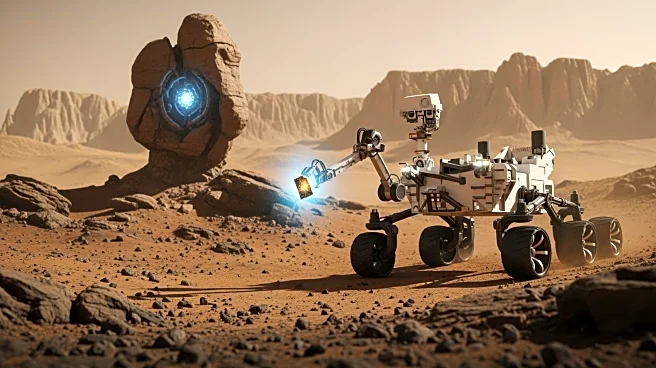What's Happening?
NASA's Perseverance rover, part of the Mars 2020 mission, has identified organic molecules in the Bright Angel region near Jezero Crater on Mars. The discovery was made using the SHERLOC instrument, which
employs Raman spectroscopy to detect potential biosignatures. These organic molecules could have geological or biological origins, and further study is required to determine their significance. The rover's mission focuses on astrobiology, aiming to find signs of ancient microbial life and characterize Mars' geology and climate. Managed by Caltech and operated by JPL, Perseverance is the first mission to collect and cache Martian rock and regolith.
Why It's Important?
The detection of organic molecules by Perseverance is a significant step in understanding Mars' potential to support life. Organic molecules are fundamental to life as we know it, and their presence on Mars could indicate past microbial life or provide insights into the planet's geological processes. This discovery supports NASA's broader Moon to Mars exploration strategy, which includes preparing for human exploration of Mars. The findings could influence future missions and research, potentially leading to breakthroughs in astrobiology and planetary science.
What's Next?
Further analysis and study of the organic molecules detected by Perseverance are necessary to determine their origins. NASA plans to continue its exploration of Mars, with Perseverance playing a crucial role in collecting samples for future retrieval missions. These efforts are part of a long-term strategy to pave the way for human exploration of Mars. The scientific community will likely focus on understanding the implications of these findings, which could lead to new hypotheses about Mars' history and its capacity to support life.
Beyond the Headlines
The discovery of organic molecules on Mars raises ethical and scientific questions about planetary protection and the potential for contamination. As exploration continues, ensuring that missions do not inadvertently introduce Earth-based organisms to Mars is crucial. This finding also contributes to the cultural and philosophical discourse on humanity's place in the universe and the possibility of life beyond Earth. Long-term, these discoveries could influence space policy and international collaboration in planetary exploration.









